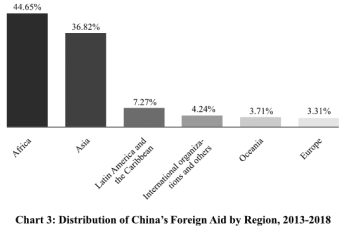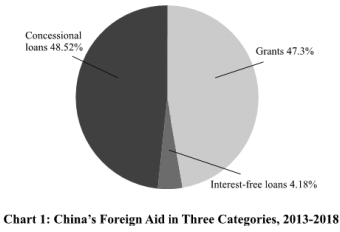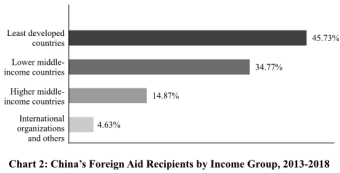China's International Development Cooperation in the New Era

4. Practical Measures for Development Cooperation



Respecting its solemn commitments, China has taken practical actions in development cooperation. President Xi Jinping has announced measures for development cooperation on many international occasions, which will contribute to global development.
-Fulfilling its duties as a major country and providing global development with public goods.
During the summits commemorating the UN's 70th anniversary in September 2015, President Xi announced the following commitments for the next five years:
? supporting "six 100 projects"-100 poverty reduction projects, 100 agricultural cooperation projects, 100 aid for trade projects, 100 ecological conservation and climate change response projects, 100 hospitals and clinics, and 100 schools and vocational training centers;
? helping implement 100 maternal and child health care projects and 100"happy campus" projects;
? setting up an assistance fund for South-South cooperation and a China-UN peace and development fund;
? launching training and scholarship programs for people from other developing countries to study in China;
? writing off debts on eligible countries' interest-free loans; and
? establishing an institute of South-South cooperation and development and a center for international knowledge on development.
At the opening of the virtual 73rd World Health Assembly on May 18, 2020, President Xi announced measures for supporting international cooperation against Covid-19, including:
? providing an assistance fund of US$2 billion over two years;
? working with the UN to set up a global humanitarian response depot and hub in China;
? establishing a cooperation mechanism for its hospitals to pair up with 30 African hospitals;
? making Covid-19 vaccines available as a global public good once they have been developed and applied in China; and
? working with other G20 members to implement the Debt Service Suspension Initiative for the poorest countries.
-Increasing aid to other developing countries within the Belt and Road framework.
At the First Belt and Road Forum for International Cooperation in 2017, President Xi announced that China would:
? provide assistance worth RMB60 billion to launch more projects to improve people's wellbeing in the following three years;
? provide emergency food aid worth RMB2 billion;
? make an additional contribution of US$1 billion to the SSCAF;
? launch 100"happy home" projects, 100 poverty alleviation projects, and 100 health care and rehabilitation projects; and
? provide relevant international organizations with US$1 billion.
At the Second Belt and Road Forum for International Cooperation in 2019, President Xi announced that China would:
? implement the Belt and Road South-South Cooperation Initiative on Climate Change;
? expand cooperation in agriculture, health, disaster mitigation and water resources;
? invite 10,000 representatives to visit China;
? encourage and support extensive cooperation on public wellbeing projects among social organizations of participating countries; and
? continue to run the Chinese government scholarship Silk Road Program.
-Proposing cooperation schemes with developing countries through regional cooperation mechanisms.
President Xi Jinping has proposed many aid plans to boost economic and social development and people's wellbeing in recipient countries at bilateral and multilateral conferences such as the Forum on China-Africa Cooperation (FOCAC), the Shanghai Cooperation Organisation, the Forum for Economic and Trade Cooperation Between China and Portuguese-Speaking Countries, the China-Arab States Cooperation Forum, the Forum of China and the Community of Latin American and Caribbean States, the China-Caribbean Economic and Trade Cooperation Forum, and the China-Pacific Island Countries Economic Development and Cooperation Forum.
At the FOCAC Johannesburg Summit in December 2015, President Xi put forward ten major cooperation programs with Africa for the following three years, covering industrialization, agricultural modernization, infrastructure, finance, green development, trade and investment facilitation, poverty reduction, public health, cultural and people-to-people exchanges, and peace and security.
At the FOCAC Beijing Summit held in September 2018, President Xi stated that China would launch eight major initiatives in the next three years and beyond, covering industrial development, infrastructure connectivity, trade facilitation, green development, capacity building, health care, people-to-people exchanges, and peace and security.
At the Extraordinary China-Africa Summit on Solidarity Against Covid-19 in June 2020, President Xi said that China would continue to do everything possible to support Africa's response to Covid-19, work with Africa to accelerate the follow-ups to the FOCAC Beijing Summit, give greater priority to cooperation on public health, business reopening, and people's wellbeing, and build an even stronger China-Africa community of shared future.
The Chinese government is actively fulfilling its commitments to development cooperation. All the measures listed above have been completed or are progressing as scheduled, turning into solid contributions to global development.
II. Achieving New Progress in International Development Cooperation
China has continued a steady increase in the scale of its international development cooperation, giving high priority to the least developed countries in Asia and Africa and developing countries participating in the Belt and Road Initiative. To adapt to changes in the domestic and international situation, China has reformed its management system and is exploring new ways to promote international development cooperation with better results.

































